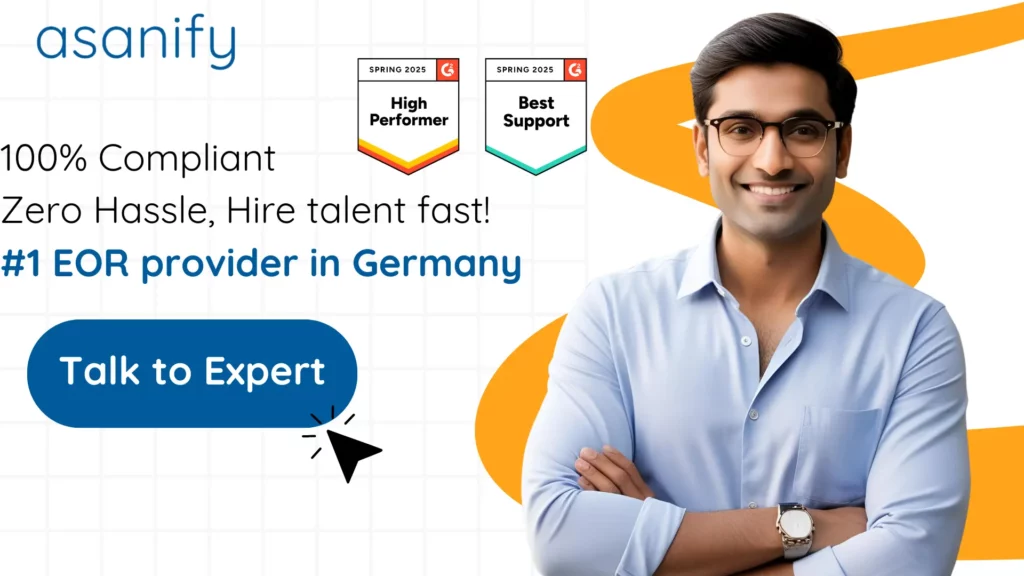Germany stands as a top-tier outsourcing destination in Europe in 2025—blending engineering excellence, robust compliance standards, and seamless cross-border collaboration. As Europe’s largest economy and a global leader in manufacturing, fintech, and digital innovation, Germany offers global businesses an opportunity to scale operations with unmatched quality and operational control.
What sets Germany apart isn’t just its economic strength, but its talent pool, transparent legal systems, multilingual professionals, and culture of precision. Whether you’re a startup looking to expand operations or an enterprise seeking to reduce risk in regulated industries, outsourcing to Germany gives you long-term strategic advantage.
This guide walks you through how to outsource work to Germany: what to outsource, why Germany is uniquely suited for high-value tasks, how to evaluate vendors (including Employer of Record service providers), legal compliance, cost breakdowns, and success strategies for global teams.
Table of Contents
- What is Outsourcing and Why Do Companies Do It?
- Overview of the Outsourcing Industry in Germany
- Why is Germany a Hotspot for Outsourcing in 2025?
- What Types of Work Can You Outsource to Germany?
- Three Commonly Outsourced Services in Germany
- Step-by-Step Guide to Outsourcing to Germany
- Legal and Compliance Considerations
- Cost Breakdown – How Much Can You Save?
- Outsourcing Projects from the USA to Germany
- Conclusion
- FAQs
What is Outsourcing and Why Do Companies Do It?
Outsourcing refers to delegating specific business functions to external service providers instead of managing them internally. While outsourcing often aims to reduce costs, in 2025 it’s increasingly about accessing specialized talent, improving efficiency, and navigating local compliance with minimal overhead.
Companies may outsource tasks like IT development, compliance audits, customer support, or payroll management to free up internal resources and remain agile. Outsourcing also enables companies to enter new markets more quickly, especially when the legal or hiring framework is complex.
Germany, as a nearshoring destination, offers a hybrid approach: access to high-quality service, lower risk, and legal alignment with other EU nations. Many global firms now choose to outsource to Germany for critical or sensitive functions—especially in regulated sectors like finance, legal, or health tech.
Overview of the Outsourcing Industry in Germany
Germany’s outsourcing industry is built on precision, reliability, and technical expertise. Unlike traditional outsourcing hubs that focus on cost arbitrage, Germany’s value proposition lies in delivering high-end services in IT, legal, finance, engineering, and operations—backed by strong data protection laws and process maturity.
Key outsourcing hubs include Berlin, Munich, Frankfurt, Hamburg, and Stuttgart. These cities offer an excellent blend of talent, R&D, startup ecosystems, and access to EU digital infrastructure. Government-backed digitization programs and pro-business reforms have made Germany more outsourcing-friendly, particularly for cross-border digital services.
German providers—ranging from IT firms and consulting agencies to Employer of Record service providers—are well-versed in EU labor law, ISO standards, GDPR compliance, and enterprise-scale service delivery. In 2025, global companies increasingly choose Germany when the focus is on quality, accountability, and long-term strategic partnerships.
Why is Germany a Hotspot for Outsourcing in 2025?
1. High-Quality Talent and Engineering Precision
Germany is home to one of the most educated workforces in the world. With a strong emphasis on STEM fields, universities like RWTH Aachen, LMU Munich, and TU Berlin produce highly skilled professionals in engineering, software, AI, and data science.
Outsourcing to Germany means you gain access to specialists with deep technical knowledge, fluent English skills, and global project experience. The German culture of thoroughness and quality assurance makes it ideal for complex or mission-critical processes.
2. Full Compliance and GDPR Assurance
Germany has one of the strictest data protection regimes in the world. All outsourcing partners in the country comply with GDPR, making it a secure destination for companies handling sensitive customer, legal, or financial data.
Whether you’re outsourcing cloud infrastructure, health records processing, or tax advisory—German vendors operate under legally binding contracts with full transparency.
3. Multilingual and Culturally Compatible Workforce
In addition to German and English, many professionals also speak French, Spanish, or Dutch, making Germany ideal for managing multi-country support operations. Cultural proximity to Western clients means fewer misunderstandings, stronger engagement, and smoother onboarding.
4. Strategic EU Location and Time-Zone Advantage
Germany’s central European location ensures operational continuity across the EU, UK, and even parts of the U.S. East Coast. Time-zone overlap enables real-time meetings, fast iteration cycles, and easier project handoffs—making Germany a prime location for agile workstreams and shared service centers.

What Types of Work Can You Outsource to Germany?
Germany provides a robust and reliable outsourcing ecosystem, particularly suited for businesses that prioritize data security, engineering excellence, and regulatory compliance. Backed by a strong educational system, skilled multilingual professionals, and cutting-edge infrastructure, Germany is ideal for outsourcing sophisticated, value-driven work rather than volume-based transactional tasks.
U.S., UK, and EU companies often outsource to Germany when they need precision-driven teams for legally sensitive, technically complex, or customer-facing operations. German providers bring a strong culture of accountability, timeliness, and high performance.
Commonly outsourced functions to Germany include:
- Software development and engineering (enterprise apps, embedded systems, custom tools)
- Cybersecurity and IT compliance audits
- Finance and accounting (especially for EU tax frameworks and regulatory reporting)
- Legal process outsourcing (GDPR advisory, M&A due diligence, contract lifecycle management)
- Customer support (multilingual teams for German, English, French, etc.)
- Cloud infrastructure and DevOps support
- Product design, prototyping, and UX research
- B2B content creation and technical documentation
- Human resources, recruitment, and benefits administration
Outsourcing to Germany offers more than just operational efficiency—it positions your company for high-trust collaboration with partners who understand the European business landscape. This makes it a go-to destination for businesses seeking sustainable, compliant growth across the EU.
Suggested Read: Understanding Labour Laws in Germany: Contracts, Wages, and Termination Rules
Three Commonly Outsourced Services in Germany
1. IT and Software Development
Germany excels in high-quality software engineering and systems design. Outsourced teams handle backend systems, embedded software, industrial automation, and full-stack applications with strong documentation and agile delivery.
2. Legal and Regulatory Services
German law firms and compliance consultants assist international companies with GDPR audits, data localization rules, IP protection, and contract drafting—ensuring your EU operations stay audit-ready.
3. Employer of Record (EOR) Services
Employer of Record (EOR) providers in Germany help companies employ local talent without registering a subsidiary. They handle employment contracts, payroll processing, statutory benefits, and labor law compliance, allowing you to focus on managing remote team’s output.
Step-by-Step Guide to Outsourcing to Germany
- Assess Your Outsourcing Needs
Identify what functions can be delegated—whether software development, legal, HR, or support. - Choose Your Operating Model
Decide between hiring a service provider or working with an Employer of Record for workforce expansion. - Research German Providers
Shortlist vendors based on domain expertise, language capabilities, compliance certifications, and client reviews. - Send RFPs and Evaluate Offers
Clearly define your scope, deliverables, timelines, and data security expectations. Vet providers for legal and financial stability. - Sign Contracts with SLAs and Compliance Clauses
Ensure you include NDAs, data handling policies, IP ownership terms, and exit clauses. - Onboard the Team or Vendor
Share documentation, tools, brand guidelines, and introduce workflows and communication systems. - Maintain Communication and Oversight
Use Slack, Teams, or Notion for daily collaboration. Schedule reviews and performance evaluations regularly.

Best Practices to Make Outsourcing to Germany a Success
Define a Clear Scope and Compliance Framework:
Outline your deliverables, timelines, data protection expectations, and KPIs. Include GDPR-specific requirements in your documentation from the start.
Engage a Legal or Tax Advisor (Optional):
Germany’s legal system is detailed and documentation-heavy. A local consultant can help navigate contracts, social contributions, and tax rules if you’re outsourcing regulated functions.
Use a Structured Vendor Evaluation Scorecard:
Assess providers based on certifications (e.g., ISO, GDPR), language capabilities, project history, and pricing transparency. Shortlist based on both capability and legal reliability.
Establish a Consistent Communication Rhythm:
Set up recurring touchpoints—weekly project check-ins, monthly compliance reviews, and quarterly feedback cycles to ensure ongoing alignment.
Anticipate Cultural Formality and Precision:
Expect highly structured, detail-oriented delivery from German vendors. Be prepared with clear specs and defined approval workflows.
Invest in Onboarding and Brand Training:
Ensure your outsourced team understands your tools, tone, security protocols, and project values—especially if customer-facing.
Document Everything Thoroughly:
Germany values detailed documentation. Maintain updated SOPs, shared dashboards, and signed agreements to reduce miscommunication and liability risks.
Pros and Cons of Outsourcing to Germany
Outsourcing to Germany in 2025 offers global companies a high-trust, regulation-aligned environment to scale operations across Europe. Germany is known for its technical expertise, legal precision, and multilingual workforce—making it ideal for complex or sensitive functions. However, compared to outsourcing hubs in Eastern Europe or Asia, Germany comes at a premium cost. Below is a detailed comparison of the key pros and cons to help you determine if Germany is the right outsourcing destination for your business.
| Pros | Cons |
|---|---|
| Exceptional engineering and software development talent | Higher labor and operational costs than CEE or Asian countries |
| Strong data security and GDPR compliance | Slower vendor onboarding due to thorough legal processes |
| Multilingual, culturally aligned professionals | Limited freelance supply for short-term or small-scale projects |
| Strategic EU location with ideal time-zone overlap |
Legal and Compliance Considerations
- GDPR Compliance: Mandatory for all outsourcing engagements; requires clear data processing agreements (DPAs).
- IP Protection: Ensure IP transfer clauses are included in your contracts.
- Employment Law: If hiring directly or via EOR, you must provide mandatory benefits (e.g., health insurance, paid leave, social contributions).
- Tax and Invoicing: Vendor contracts must follow EU VAT rules and be reviewed for cross-border withholding tax implications.
- EOR Compliance: Ensure the provider is registered in Germany and compliant with Arbeitsrecht (labor law) and Sozialgesetzbuch (social security code).
Cost Breakdown – How Much Can You Save?
Germany is not a low-cost destination, but it offers tremendous value in quality, compliance, and reduced risk.
| Role | Avg Monthly Cost (EUR) | US Equivalent (USD) |
| Senior Software Engineer | €5,500 – €7,500 | $10,000 – $12,500 |
| Legal & Compliance Consultant | €4,500 – €6,000 | $9,000 – $11,000 |
| Customer Support (Bilingual) | €2,800 – €3,800 | $5,000 – $6,500 |
Cost advantages of outsourcing to Germany include avoiding incorporation costs when using an Employer of Record (EOR), reducing legal risks and the time required for audit preparation, and eliminating long-term employment obligations by engaging through vendor contracts. These factors make Germany a financially strategic choice for companies seeking high-quality outcomes without the overhead of setting up a local entity.

Outsourcing Projects from the USA to Germany
The outsourcing relationship between the U.S. and Germany has gained significant traction in 2025, especially in sectors like software engineering, legal compliance, cybersecurity, and regulatory consulting. U.S. companies choose German vendors for their precision, data privacy rigor, and ability to navigate complex German Labour laws—making Germany an ideal partner for high-trust, mission-critical work.
Germany’s time-zone offset also supports “follow-the-sun” workflows, allowing U.S.-based teams to receive overnight progress updates and faster iteration cycles.
Use cases include:
- U.S. fintech firms outsourcing EU tax reporting and regulatory advisory to German compliance consultants
- Healthtech companies partnering with German developers to build GDPR-compliant digital infrastructure
- Startups hiring German EOR providers to onboard engineers and customer success teams across Europe
Suggested Read: A Detailed Guide on Employer Of Record Germany 2025
Conclusion
Germany in 2025 is the ideal outsourcing partner for companies prioritizing compliance, quality, and strategic alignment. While not the cheapest destination, it delivers extraordinary value in terms of trust, professionalism, and results.
Whether you outsource software engineering, regulatory support, or build a remote team using Employer of Record services, Germany helps you enter the EU market confidently and compliantly. Platforms like Asanify streamline this further by offering EOR, payroll, and compliance automation for seamless expansion.
FAQs
Yes, it offers high-quality services, legal transparency, and access to EU markets.
Software development, legal compliance, customer support, and payroll.
Yes, most professionals working with global clients are fluent in English.
Yes, you can use Employer of Record (EOR) services to stay compliant.
Absolutely—Germany enforces some of the strictest data laws in the EU.
Yes, you can save 30–40% on equivalent high-skill roles.
Yes, many are certified and experienced in regulated sectors.
Typically 1–3 weeks depending on contract and scope.
Yes, especially for long-term or regulated-service agreements.
It handles contracts, taxes, and benefits while you manage the team directly.
Not to be considered as tax, legal, financial or HR advice. Regulations change over time so please consult a lawyer, accountant or Labour Law expert for specific guidance.

